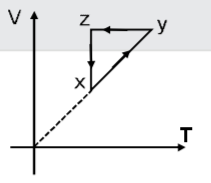Choose the correct answer :
If pressure is doubled for a fixed mass of a gas, its volume will become
4 times
1/2 times
2 times
No change
To solve the question "If pressure is doubled for a fixed mass of a gas, its volume will become," we can use Boyle's Law, which states that the pressure and volume of a gas are inversely related when the temperature is held constant.
1. Understand Boyle's Law: According to Boyle's Law, for a fixed mass of gas at constant temperature, the product of pressure (P) and volume (V) is constant. This can be expressed mathematically as:
P1V1=P2V2
2. Define Initial Conditions: Let the initial pressure be P1=P and the initial volume be V1=V.
3. Define Final Conditions: If the pressure is doubled, then the final pressure will be:
P2=2P
We need to find the final volume V2.
4. Substitute Values into Boyle's Law: Now we can substitute the known values into the equation:
P1V1=P2V2
Substituting the values we have:
P⋅V=(2P)⋅V2
5. Cancel Out the Pressure: We can cancel P from both sides (assuming P≠0):
V=2V2
6. Solve for Final Volume: Rearranging the equation gives:
V2=V2
This means that when the pressure is doubled, the volume becomes half of the initial volume.
Final Answer:
Therefore, if the pressure is doubled for a fixed mass of gas, its volume will become half.
P1V1=P2V2
P2=2P
We need to find the final volume V2.
P1V1=P2V2
Substituting the values we have:
P⋅V=(2P)⋅V2
V=2V2
V2=V2
This means that when the pressure is doubled, the volume becomes half of the initial volume.
Therefore, if the pressure is doubled for a fixed mass of gas, its volume will become half.
Similar Questions
Knowledge Check
- Question 1 - Select One
If the pressure is doubled for a fixed mass of gas, its volume will become
A4 timesB1/2 timesC2 timesDNo change - Question 2 - Select One
For a given mass of a gas, if pressure is reduced to half and temperature is doubled, then volume V will become
A4VB2V2CV4D8V. - Question 3 - Select One
Assertion : At constant pressure, the volume of a given mass of a gas is inversely proportional to its absolute temperature.
Reason : At absolute zero, the volume of a gas reduces to zero.AIf both Assertion and Reason are CORRECT and Reason is the CORRECT explanation of the Assertion.BIf both Assertion and Reason are CORRECT but Reason is not the CORRECT explanation of the Assertion.CIf Assertion is CORRECT but Reason is INCORRECT.DIf Assertion is INCORRECT but Reason is CORRECT.
Choose the correct answer :
Volume-temperature relationship is given byView SolutionCorrect the following statements, wherever necessary.
Volume of a fixed mass of a gas is directly proportional to its temperature, pressure remaining constant.View SolutionA monatomic ideal gas is heated at constant volume until its pressure is doubled. It is again heated at constant pressure, until its volume is doubled. Find molar specific heat for the whole process.
View SolutionIn a process, the pressure of a gas remains constant. If the temperature is doubles, then the change in the volume will be.
View SolutionIf the aboslute temperature of a gas having volume Vcm3 is doubled and the pressure is reduced to half, the final volume will be
View Solution

